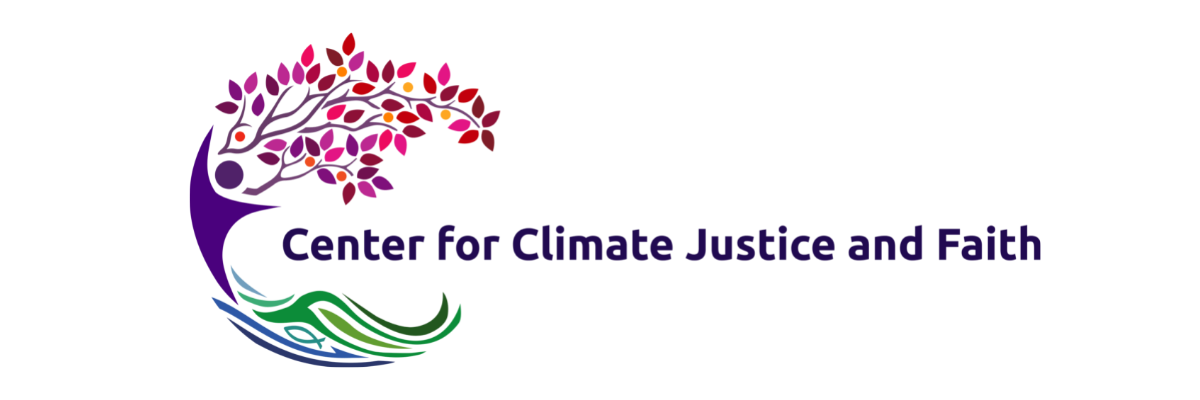Certificate in Faith-rooted Community Organizing for Climate Justice
A 9-month, online program for faith-based teams ready to act for climate justice
Climate change is one of the defining moral issues of our time. People of faith bring unique values, networks, and commitments to justice that can spark powerful community action. This program invites faith leaders and communities from all traditions to join together in learning, relationship, and action for climate justice.
Apply with a team of at least three people from your congregation or faith group. Applications are closed for 2026. Sign-up for our newsletter to be notified when applications open for 2027.
Description
The Community Organizing for Climate Justice course equips leaders with a climate justice framework and practical tools to implement team-based climate resiliency projects or other climate justice projects in their communities.
Full Description
The Community Organizing for Climate Justice course equips leaders with a climate justice framework and practical tools to implement team-based climate resiliency projects or other climate justice projects in their communities. Faith-based community organizing for climate justice provides participants with skills, knowledge, spiritual grounding, and a community of support for organizing to address the climate crisis in ways that build racial and economic equity. A sequence of workshops, small group coaching and community practice will allow program participants to understand themselves as leaders, expand their capacity to enroll others in collective action, and understand the roles of teams in creating change.
Course Topics
- Explore the connections between faith, justice, and climate
- Practice community listening tools (1:1s, house meetings, listening campaigns)
- Conduct research and analysis of local climate issues
- Identify a shared issue for action with your team
- Power analysis and strategy development
- Design and enact an action plan rooted in your community’s needs
- Build lasting partnerships for climate justice across traditions
Frequently Asked Questions
What kind of projects work well for this class?
We will work with individuals throughout the course to further develop their projects but generally speaking projects should have a climate justice focus, be able to be lead and implemented by a team of people, and work to impact system change.
What is the time commitment?
90 contact hours, 90 hours in community practice working individually and as a team to put their learning into action.
Who Should Apply?
- Teams of 3-6 people ready to learn together, organize together, and act together. Any combination of faith leaders, lay leaders, and community members called to connect their spiritual values with climate justice.
How much does the program cost?
$1,200 for each team of 3-6 people.
Is financial aid available?
Tuition assistance available for eligible participants.
How do coaching sessions work?
teams meet in small groups with their coach to focus on applying the workshops skills and course materials to their community context.
Instructors
Community Organizing for Climate Justice as Love in Action is taught be Via Consulting Cooperative. Via Consulting Cooperative is a collective of evaluators, faith leaders, and community organizers with over 50 years combined experience in community organizing and both qualitative and quantitative participatory program evaluation in community development, education, and faith-based contexts.
As long time leaders in communities affected by racialized capitalism, members of our collective have done the work of local level response and disaster preparedness and have led both climate justice campaigns – connecting stormwater management to green jobs, green new deal for housing and climate action in community – CR boxes, measuring air quality.
Maureen Okasinski, University of Michigan School of Social Work
Maureen's Bio
Maureen integrates academic rigor with practical, community-led practices in her work. She has 20 years experience in leadership, program development, research, design and evaluation, grant writing and management, budget management, and direct practice. This includes nine years of social work teaching, fourteen years of social work practice and six years in consulting. She currently teaches at the University of Michigan, where she earned an MSW
Meghan Sobocienski, Grace in Action Collectives in Detroit, MI
Meghan's Bio
Meghan is a Co-Founder and Director of Grace in Action Collectives in Southwest Detroit. Meghan spent five years as a Community Organizer with the PICO (Faith in Action Network), and five years working as a Co-Organizer for the Organizing for Mission Cohort (Network) through the Evangelical Lutheran Church in America (ELCA). Through this work Meghan guided congregational leaders to utilize their land, financial, and community resources to create social justice projects in their communities. Meghan has an MDiv. from PLTS (CLU), an MSW from Eastern Michigan University, and is an ordained Deacon in the ELCA.
Bianca Vazquez, Beloved Community Incubator in Washington, DC
Bianca's Bio
Bianca is the Program Director at Beloved Community Incubator in Washington, DC. Neighborhood listening sessions led to her engagement with small micro-business projects with local residents, which led to the founding of BCI. Bianca is trained in community organizing by the Industrial Areas Foundation, Faith in Action Network, and Gamaliel Network. She works in Washington, DC, where she has shaped the creation of mutual aid disaster response networks and led worker campaigns for almost a decade.
Questions?
For more information please contact:
Via Collaborative
Coordinators of Community Organizing for Climate Justice as Love in Action
Course Timeline
Dec 15, 2025 – Applications Due
Dec 20, 2025 – Acceptance Letters Sent
Jan 15, 2026 – Registration & Fee Due
Jab 15-30, 2026 – Attend Office Hours with team
Feb 4, 2026 – First Workshop Session
August 2026 – Summer Break
Dec 2, 2026 – Final Session



